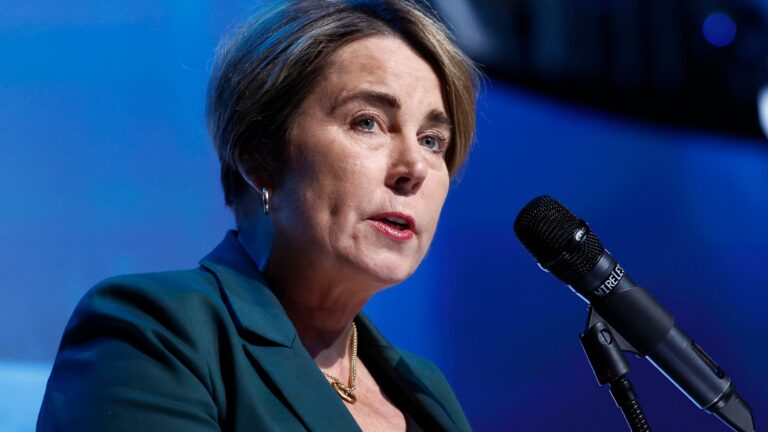Extra News Alerts
Get breaking updates as they happen.

Massachusetts Gov. Maura Healey on Thursday announced a plan to provide $400 million to support research projects at universities and colleges in the state, as many schools have faced funding cuts by the Trump administration.
The money, which must be approved by the state Legislature, would be aimed at retaining and creating jobs in research and development. In the Boston area especially, colleges and teaching hospitals that have fueled technological and biomedical advances over decades are cornerstones to the city’s economy and identity.
The governor’s office cited a report by the Donahue Institute at the University of Massachusetts Amherst that found that federal research funding in the state supported more than 81,000 jobs. Massachusetts is also home to 1 of every 10 jobs in research and development in the country, the governor’s office said.
The Trump administration has sought to strip billions in research funding from schools in the state and around the country, including Harvard University, in Cambridge, Massachusetts, as part of what it says is a campaign against antisemitism. The White House has also sought to withhold federal money as a way to correct what it sees as a higher education system that is hostile to conservatives.
Harvard has fought back on funding cuts in court, with a decision still pending, while some other schools have joined lawsuits brought by separate groups or reached deals with the administration that would free up the money.
Harvard has not spoken publicly about its negotiations with the White House, but the university has signaled that it would be willing to spend up to $500 million in connection with a deal. But the university is also skeptical of any agreement that would allow the government to monitor its actions, which some people feel would imperil its independence.
In a letter Thursday, nine prominent members of Harvard’s faculty warned university leaders against provisions that could compromise academic freedom and said that the school must keep the government out of personnel decisions and not agree to share data about applicants, faculty, staff or students with any outside agencies.
Healey, a Democrat, did not mention Harvard by name in a statement announcing the plan but made a reference to the climate that prompted it. “In the face of uncertainty from the federal government, this is about protecting one of the things that makes Massachusetts so special,” she said, adding that the state was a global leader in “innovative research and the discovery of lifesaving cures.”
Later, at a news conference Thursday afternoon, Healey said the proposed legislation “isn’t just about filling gaps left by federal cuts.” But she also acknowledged that the Trump administration’s actions have hurt the state’s research economy and that they have left the state vulnerable to competition from other countries.
Under Healey’s plan, $200 million would go directly toward supporting research projects at hospitals, universities and independent research institutions. Another $200 million would help cover the costs of research, partnerships and joint ventures at public universities.
The proposed money would draw from the state’s “rainy day” emergency fund, as well as revenue that the state raised through its so-called millionaires tax, which increased the taxes that residents pay on personal income over $1 million to help fund public education and transportation.
Amy Carnevale, chair of the Massachusetts Republican Party, said Republicans in the state objected to the use of those funds for university research, since voters may have approved the tax with K-12 education in mind. She also said there were better uses of the state’s rainy-day funds.
“There’s certainly more pressing needs in Massachusetts at this time,” she said, citing the work stoppage by public defenders that has snarled the state’s court systems.
Lane Glenn, president of Northern Essex Community College, a public school in Haverhill, Massachusetts, described the governor’s plan in an interview as a strong investment, even if he does not expect it to make up for the scale of the federal cuts.
“There’s no way that individual states can compensate for that,” Glenn said. “So the governor is being strategic, and she’s putting money where it matters a lot in Massachusetts, and where it tends to have a ripple effect in communities that are touched by the research institutions across the state.”
Eve Weinbaum, a professor of sociology and labor studies at the University of Massachusetts Amherst and vice president of the Massachusetts Society of Professors, the union representing the school’s faculty, said the funding would be especially valuable to the state’s public university system.
“Public universities do not have the kind of the kind of endowment that Harvard University has,” Weinbaum said. “There’s no fund to fall back on to keep people employed, to keep labs running, to keep the important research going. So it’s really a relief that the governor is proposing at least this emergency fund to get us through a really hard time.”
This article originally appeared in The New York Times.
Get breaking updates as they happen.
Stay up to date with everything Boston. Receive the latest news and breaking updates, straight from our newsroom to your inbox.
Conversation
This discussion has ended. Please join elsewhere on Boston.com